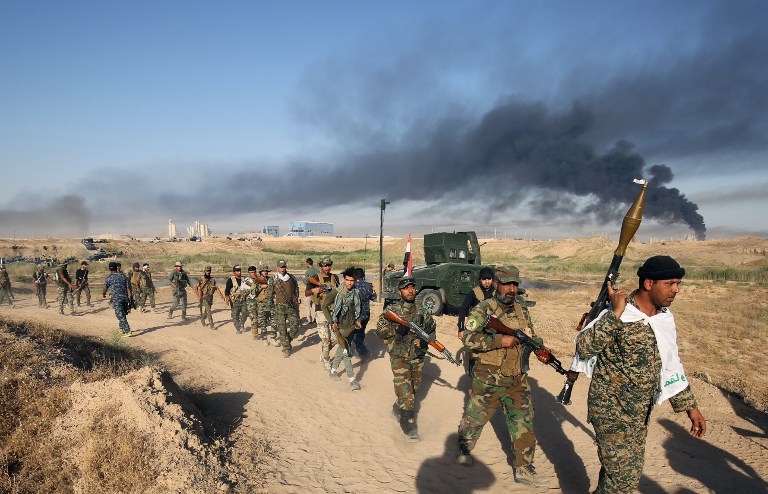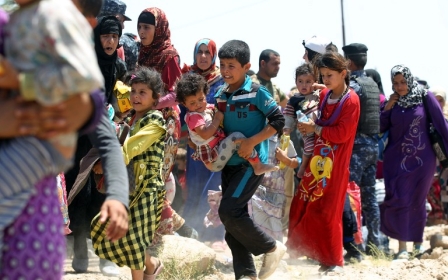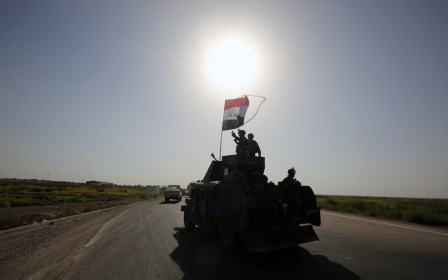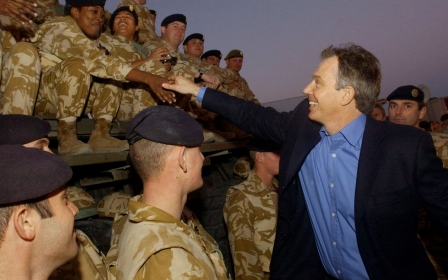Fears grow for Fallujah residents caught in the crossfire

BAGHDAD - Concerns that the end of a siege on the Iraqi city of Fallujah could see retribution attacks on Sunni residents or leave a humanitarian catastrophe are growing as Iraqi army and the allied Popular Mobilisation Units (PMUs) troops delve further into the Islamic State (IS)-controlled city.
Iraqi forces faced tough resistance from around 100 heavily armed IS militants as they attempted enter to centre of Fallujah on Tuesday, Lieutenant General Abdelwahab al-Saadi, the commander in charge of the operation, told AFP.
Saadi said Iraqi forces in the area, which also include police and army units, were eventually able to repel the attack, killing 75 militants. He did not give a figure for losses on the pro-government side.
With an estimated 50,000 civilians inside the city and only one of more than 550 families managing to flee IS's rule since the operation began on 22 May, an aid group has warned that the situation is a catastrophe in the making.
"A human catastrophe is unfolding in Fallujah. Families are caught in the crossfire with no safe way out," said Jan Egeland, secretary general of the Norwegian Refugee Council in a statement on Tuesday.
"Warring parties must guarantee civilians safe exit now, before it's too late and more lives are lost."
As fears mount for the civilians trapped in the city, militia leaders have been keen to downplay the suggestion of possible retribution against Sunni civilians, which some analysts have warned about.
"The blood of Christians, Muslims, Yazidis and Turkmen is all equal when it falls on Iraqi soil,” said Dhafer Lawees, a spokesperson for the Babylon Battalion, the only Christian PMU in Iraq, which is taking part in the fighting in Fallujah.
Lawees told Middle East Eye that the claims of a sectarian “massacre” in Fallujah were spread by foreign elements and politicians.
"This [participation] is a big strike against those who say that the hashd (PMUs) is sectarian and only comes from one sect - the Shia,” he said.
“It's a big win against those who criticise them in Saudi, and Qatar, and against the sectarians and unpatriotic politicians."
Abu Mahdi al-Muhandis, an Iraqi military commander who oversees the PMUs, issued a warning last Wednesday to the groups urging them to respect the rights of Fallujah citizens and not regard them as enemies.
“The residents of the areas of Fallujah undergoing liberation are our people,” read the statement.
“The purpose of the operations seeking to liberate Fallujah is to bring security and peace back to the city, and to rid it of terrorism.”
Despite the assurances, numerous horror stories have spread through social media about atrocities already carried out by Shia militia groups in Fallujah.
According to Al-Jazeera, Sheikh al-Jumaili, a member of Fallujah's tribal council, said Shia militias were torching mosques and homes in al-Karmah, a town about 16km northeast of Fallujah after it was captured by government forces on Friday.
He reportedly said that the militias had demolished the historic areas of al-Karmah and Ibrahim Ali Hassoun Mosque with explosives.
In response, Brigadier Rasool Yahya said that there was an official policy of not targeting mosques, although he added that “when a mosque becomes a centre for terror then we deal with it".
Others spread photos on social media purporting to show the mosque destruction:
One Twitter user, who claimed to be the "official spokesperson for the Sunni Popular Mobilisation of Iraq" tweeted at the beginning of the assault, apparently reflecting the fears of the Sunni inhabitants of Fallujah.
"The attacks on Fallujah have started," he wrote. "They are destroying everything and scorching the earth - this is what they mean by liberation. Women and children are begging God for help."
Last Thursday, Colonel Steve Warren, the spokesperson for the US-led anti-IS coalition tweeted that the Shia PMUs had said “publicly and privately that they will remain outside Fallujah” and would not enter the city.
According to officials quoted by AFP, they were still active in the rural countryside on Monday attempting to clear an area northwest of Fallujah called Saqlawiya.
However, he added, the influence of the Iran-backed PMUs on the future stability of Iraq - post-Mosul - is a separate issue that should raise questions.
The question of Mosul has already stirred up controversy.
Earlier in March, the Ninevah Provincial Council took the decision to oppose the deployment of PMUs in the province - of which Mosul is the capital - in order to "deny IS the opportunity to exploit the PMUs' participation in order to recruit the people of Nineveh in its ranks," referring to the militias' potential to alienate Sunnis.
Considering the enormity of the challenge that faces Iraqi forces in taking back Mosul, however, few could imagine the PMUs not being part of the campaign and the impact of their presence has concerned US policymakers.
Lawees, the Babylon Battalion brigades spokesperson and also a former native of Mosul, dismissed these claims as more scaremongering.
"There are demands [for the PMU to take part in the Mosul operation]," he told MEE indignantly.
"The people who gave Mosul away are demanding that the PMUs don't take part in the battle to liberate it. Where were you when our forces lost control of Mosul? When they gave their land away? They fled to Kurdistan and threw away their weapons. Mosul was occupied by five cars. And now they are demanding that the PMUs don't take part? No."
New MEE newsletter: Jerusalem Dispatch
Sign up to get the latest insights and analysis on Israel-Palestine, alongside Turkey Unpacked and other MEE newsletters
Middle East Eye delivers independent and unrivalled coverage and analysis of the Middle East, North Africa and beyond. To learn more about republishing this content and the associated fees, please fill out this form. More about MEE can be found here.




